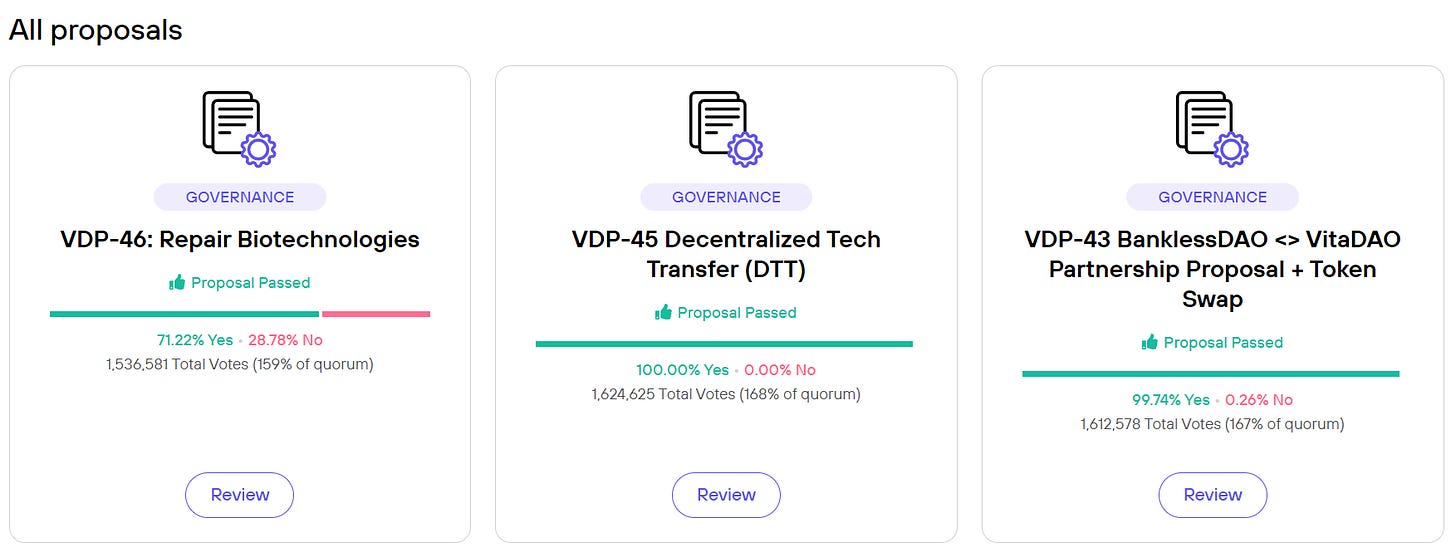Molecule DAO: How the funding of basic research can be restructured
A quick dive into Molecule DAO and the importance of IP-NFTs
Introduction
As someone who has personally entered the biotech space from a tech transfer perspective Molecule DAO has been a company I have been closely following for the last year. Tech transfer is typically an extremely slow moving space that relies heavily on the US Patent Office and grant funding for future research.
Molecule DAO now has the opportunity to change that by leveraging the new tools of web3 to realign incentives in the biotech space (this will be a consistent theme of this newsletter). Using DAOs and tokens they want to find new ways to secure funding for basic research that can lead to future therapies and cures for diseases. This process is currently slow, difficult, and leaves out the key stakeholders of the patients who actually have the disease.
This is why I believe if Molecule DAO ends up being successful they can revolutionize the biotech industry through quick moving research and IP that is funded and controlled by the people that need it the most.
Traditional Tech Transfer
I should begin with a quick overview of tech transfer, along with the role it plays in the biotech world. Tech transfer is the process in which a university or research institution attempts to commercialize or license their research. This research is often not performed with the intent of commercialization and can often have little business application but it is used to further the sector of research to eventually lead to a major breakthrough. The tech transfer office’s job is to assess all the research that is performed and find possible use cases for a business or company that would be interested in licensing it.
The most important point to emphasize about tech transfer in an academic setting is that no research is made for the purpose of making a super successful drug that will make lots of money or even to make a widely adopted drug. This academic research in biotech is often basic research related to the complex mechanisms and reactions that affect drug delivery or dosing. These experiments are directed within the lab they work in but usually are not the most efficient ways to develop a new drug or therapy. Tech transfer departments often try to step in and guide research closer to a potential therapy by suggesting follow up studies or trials, but the researchers have no reason to follow their advice.
What’s the Problem?
This leads into the problem of trying to commercialize academic style research, the process is unguided, slow, and expensive. If you were a patient with something such as a blood clotting disorder and wanted the researchers of that disorder to create a therapy for you, there is currently not a way to influence their research. Those researchers will research whatever they think is most promising or more importantly will get them published. Next, the funding for this research is heavily supplied through grants which can often take months to years to acquire. Finally, this research is expensive to conduct as they create trials to lead up to the launch of a new therapy which can stop the production of a new therapy if the business case is not sufficient.
Why Molecule DAO can be the Answer
Molecule DAO has positioned itself to solve so many of these problems through the collaborative governance and funding structures that DAOs can provide. The goal of Molecule DAO is to form DAOs around specific areas of research or diseases that have large amount of patient and researcher interest. They then issue tokens so people can become members of the DAO, this fundraises for the research and provides governance rights to those who own the tokens. The members of the DAO can then use their voting rights to decide on what research they would like to fund in hopes of moving closer to a potential therapy. This also positions the IP for the research under the ownership of the DAO so if the collective group would like to sell off their assets they can do so under an IP-NFT. This provides a stream of revenue as the IP is sold under a smart contract to other interested parties even if it does not directly benefit the goal of the DAO.
This provides a streamlined process for completing basic research as funding can be supplied and directed by interested parties as well as revenue can be generated through the licensing of IP-NFTs. The goal would be to set up financially sustainable DAOs around important diseases to find therapies faster than a traditional academic or biotech route.
What they done so far?
As of July 2022 Molecule DAO has successfully formed PsyDAO and VitaDAO which have began to fund and complete research that has been voted on by members of the DAO. They have also completed a $12 million Seed Round with the hopes of expanding their scope and building out their IP-NFT marketplace. I am a huge fan of what they are trying to accomplish and will personally be joining their DAOs in the near future to help contribute to the future of biotech!
Next Week
Be sure to check in next week as I explore more topics within the biotech and web3 sector. Thanks for reading please comment if you have any feedback!




